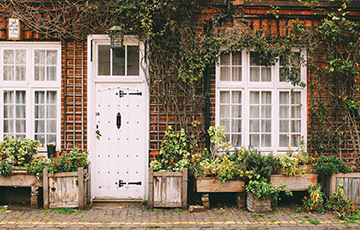Mortgage Guide for First-Time Buyers
12/02/20
A mortgage guide for first-time buyers, from a recent first-time buyer!
Being a homeowner is a wonderful feeling, particularly when it’s your first home. That feeling of independence and freedom to be able to make your mark on the property and not worry about parents or landlords. It is a lot of hard work and the process of buying a property can be frustrating at points, but the ends results are worth it.
But where do you start?
You’ve got some money saved up and want to buy your first home, but there’s so much to consider, where do you begin? Having bought my first home less than a year ago, experiencing the property purchase process first hand, both as a mortgage adviser and a home buyer, hopefully my experiences and knowledge of the process can offer some help.
Here are some things to consider which I will touch on in more detail below:
- Mortgage Affordability
- Deposit
- Purchase Costs
- Government Help to Buy Scheme
- My experiences as a first-time buyer
Mortgage Affordability:
Before you start falling in love with houses you’ve seen online, it’s important to understand how much lenders are prepared to offer you as a mortgage. As the mortgage will likely make up the majority of the purchase price, mortgage affordability is a key consideration for first time buyers.
Most of the High street Lenders that you will have heard of will offer an affordability calculator on their websites. However, the amount you can borrow can vary significantly between lenders. If you’re Self Employed, Director of a Company or on contract work, the variation in results can be even wider. Not all lenders are looking to deal with all types of circumstance.
My advice would be to speak to an Independent Mortgage Adviser that is able to give you an indication of your borrowing capacity without charging you a fee for this information.
The term of the mortgage is also an important factor to consider. A longer mortgage term will spread the cost (and interest) of the mortgage over a longer period of time. A longer mortgage will result in lower monthly repayments, but the trade-off is that you will pay more in interest over the term of the mortgage. It’s a balancing act between getting your budget right initially, but also considering the overall cost effectiveness.
Most lenders will be happy to offer a mortgage term of up to 35, providing it ends before the earlier of your intended retirement age and your 70th birthday.
Deposit:
The minimum deposit required is 5% of the purchase price. Ideally a deposit of at least 10-15% would be better as a) you’ll be able to get a lower interest rate and b) the lender will likely be more generous in their affordability calculations. The lenders also tend to be stricter with their credit score requirements for those with smaller deposits.
Gifts from family or friends can be used, providing the person giving the gift does not require repayment (they will likely need to sign a form confirming this).
Saving tips
With the cost of living constantly rising, saving money can sometimes seem like a challenge. A common mistake is trying to save what’s left at the end of the month. My advice would be to do the opposite, pay yourself first! You can set up a standing order from your main bank account into your savings account for the day after you get paid. If you don’t see the money, you can’t spend it! After a while, you won’t even notice the money going out into your savings.
Another good tip is to start small. Start by regularly saving a small amount. After a couple of months, double it. Once you’ve settled into that, increase it again. Keep going as far as you can. Soon, you’ll be saving a regular amount you wouldn’t have thought possible when you started. It’s much easier to make small adjustments to your spending over time.
Other Purchase Costs:
So, you’ve worked out how much you can borrow as a mortgage, you know roughly what property purchase prices to look at and you’ve saved up the difference between the two as a deposit. Great! But one thing that people often fail to consider is that there are other costs associated with buying a property too.
Here are some of the main additional property purchase costs that should be taken into account when saving towards your first home. I’ve based the costs on what a typical First Time Buyer in the Salisbury area might reasonably expect. Your circumstances may be different.
| Main Purchase Costs: | Estimated Cost: | Details: |
| Solicitors Fees | £1,500 – £2,000 | Exact fees depend on the Solicitor, so it’s worthwhile contacting a few Solicitors to get some quotes. |
| Stamp Duty Land Tax | First-time buyers normally exempt | Providing the purchase price is <=£300,000. |
| Mortgage Product Fees | £1,000 | Mortgage product fees are offered in exchange for lower interest rates. This often provides savings over the longer term. Whether it is worth you paying such a fee will depend on your individual circumstances. |
| Mortgage Advice Fees | £250 (with Annetts & Orchard) | Provides clarity and advice on the house buying process, finds you a great mortgage deal and takes away the stress of the mortgage application. |
| Surveyors Fees (Home-buyers Survey) | £700 – £1,200 | Not mandatory, but having a surveyor look at a prospective home could save you thousands of pounds, if they uncover issues that would otherwise have gone unnoticed (such as damp). The survey can be done before you agree to proceed with the purchase, meaning if any issues are found, you can pull out of the purchase easily. The fee depends on the surveyor and the size of the property being assessed. |
Help to Buy Scheme:
The Government introduced the Help to Buy Scheme in 2013. The aim of the scheme was to help First Time Buyers get onto the property ladder. Help to Buy includes the following schemes:
Help to Buy: Equity Loan – The Government provide a 5-year interest free loan of up to 20% of the property purchase price for certain new build properties. You only need to put down a 5% deposit and take out a mortgage for the remaining 75% of the purchase price. For example, for a property with a purchase price of £200,000, the Government could provide a £40,000 (20%) deposit, you could put down a deposit of £10,000 (5%), meaning a mortgage of only £150,000 would need to be raised.
Help to Buy: Shared Ownership – You buy part of a property and rent the rest, with the remaining stake owned by a Housing Association or Council. You therefore only need to raise the deposit and a mortgage for the share of the property that you are purchasing. For example, for a property with a full purchase price of £200,000, if you purchased an 80% share for £160,000, you would only need to put down a deposit of £8,000 (5%) on your stake of the property and raise a mortgage of £152,000. You would then pay rent on the 20% stake that you don’t own.
These are good schemes in the right circumstances, but careful consideration is required to see whether they are right for you. You can find more information on the help to buy website
My experiences as a first-time buyer:
As my wife and I bought our first home less than a year ago, I thought I would briefly go through the process and steps that we went through to purchase our home.
We had been privately renting a house for two and half year by the end of 2018 and had £44,000 available in savings, which we wanted to use towards the purchase of our first home.
The first step was to calculate the maximum affordable mortgage. I ran our details through various mortgage affordability calculators and established that a mortgage of £190,000 over a term of 35 years would be affordable.
We wanted to ensure that some of the money we had in savings was kept back after the purchase, to cover all post-purchase costs, so we started looking at properties with a capped purchase price of £220,000, which would leave us with at least £10,000 after we completed the purchase. After much deliberations we found a 3-bedroom terraced house, which we agreed to buy for £205,000. It was very dated and needed fully redecorating, so we were pleased with the low purchase price. We agreed to put down a deposit of £22,500, taking on a mortgage of £182,500 (slightly below the maximum affordable level) over a 35-year term.
After a long search, we were delighted to pick up the keys to out very own home at the beginning of February 2019.
The costs
The house needed fully refurbishing – new kitchen, new bathroom, new carpets, all the rooms redecorating, etc. Here’s a rough breakdown of our costs, during and after the property purchase:
- Solicitor = £1,600
- Deposit = £22,500
- Surveyor = £800
- Mortgage Product Fee = £1,000
- New Kitchen = £6,000
- New Bathroom = £4,000
- Replaced carpets (upstairs) and laminate flooring (downstairs) = £4,000
- Decorating materials and paint (inc. paint brushes, rollers, trays, dust sheets, etc) = £1,000
- Miscellaneous Costs (curtains, mirrors, etc) = £500
Don’t be deceived by the costings above – our purchases were fairly conservative (nothing too fancy).
We had previously been renting so thankfully had most of the furniture and appliances that we needed. We also had some very kind family members that helped us move our stuff from one house to another, meaning costs associated with moving house and buying new furniture/appliances were minimal (maybe £300 at most).
All in all, we had spent just under £42,000 on the house over the five months that we refurbished it. We had also managed to save a further £2,000 in that time, meaning from our original £44,000, we finished with £4,000, which we have since built on.
It was a long, tiring, but extremely fulfilling and satisfying experience, from which I have learned one key lesson – I am hopeless at DIY!
I hope you have found my mortgage guide and experiences helpful. If you’re looking to buy your first home, please do contact me and I will be happy to help.
Will Sharpe DipPFS Cert SMP Cert CII (ER)
Mortgage & Protection Adviser





